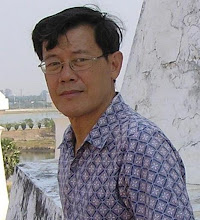A week later I received a note informing me that Phaulkon was now disposed to see me and, as I should take a gift along with my petition for the great man, Petch lent me some money for this purpose. I put on my best clothes and donned my green coat, which was like being wrapped up to be roasted in an oven.
A male slave took me to Phaulkon’s residence in the southeastern sector of the walled city, not far from the crowded shops and houses of the Moors and Chinese merchants, and from the fort near the wharf where I had arrived in Ayutthya. I was surprised to see such a fine brick building in this city where houses were usually built of impermanent wood and timber and only temples and palaces were constructed of bricks. It was an imposing residence set in an enchanting garden and surrounded by high brick walls.
A servant ushered me into an antechamber where, in the middle of the room stood a young, very beautiful and shapely woman in a white dress, immediately bringing to mind a solitary slender poplar I had seen somewhere on a hill. She stood level to my chin, her dark, expressive eyes gazing at me with keen curiosity, her face an exquisite flower, her presence imbued with the scent of jasmines. I guessed this was Petch’s sister, Wanlapa.
My Siamese was not yet fluent enough to sustain a conversation, but I was saved some embarrassment as she spoke English, having lived with Phaulkon and his wife for some years. She pronounced her words slowly and clearly, as if afraid I would not understand.
“My Lord Phaulkon will see you shortly,” she said. “Meanwhile, I will pleased to show you around the garden.” She led me towards the rear of the house, all the while keeping up a flow of conversation. “Lady Guimar, Lord Phaulkon’s wife, informs me you and Luang Petch saved her cousin, the Lady Maria Osaki, from drowning in the river.”
“That is correct,” I said, surprised, not realizing until now that the two women were cousins. “Your brother has asked me to enquire after your health.”
“Please inform him that I am very happy to be living here with Lady Guimar,” she said, turning abruptly to face me. “Lady Guimar treats me like a sister.” There was a pause, the she smiled, her slender fingers playing with a gold brooch pinned to her white muslin blouse.
The grounds were as much a delight as was the house: to the east were beds of roses, jasmines, love-lies-bleeding, to the west were intricate mazes and winding gravel paths planted with basil and spinach which we crushed at every step, giving off a piquant scent. Fountains and hidden jets d’eau were a delight and amazement. Several of Phaulkon’s English retainers were strolling about in the garden, and we stopped to exchange courtesies.
“This is our private chapel,” she said. “Phaulkon and Lady Guimar spend many hours praying here each day.”
“So they are devout Catholics?”
“That is correct,” Wan said. “Lady Guimar has lineage from both the east and west, being half Portuguese and half Japanese. The blood of the martyrs flows in her veins, for she is descended from Japanese Christians who were persecuted and expelled from Japan and settled in Ayuttaya more than 60 years ago.”
Wanlapa also took me to see the Christian girls Lady Guimar had taken under her wings, spending hours with them embroidering altar cloths and doing other charitable works. These young girls, without their benefactress’ help and support, would be forced into a life of sin. In fact, the Lady is so desirous of converting the heathen that she has bought many slave girls with that purpose in mind. Once they become true believers, they are given their freedom, or given in marriage to some worthy Christian young man.
“She also personally takes care of abandoned babies of European fathers,” Wan said, “trusting they will grow up to be good Christians. She also fervently hopes I will see the light and embrace Catholicism too, one day.”
Wanlapa showed me all the public rooms in the house, all furnished with European-style chairs, tables and cabinets of rare woods, elaborately worked and carved and decorated. In some of the rooms the floor was covered with Moorish carpets while others were left bare to show inlays of many-colored marbles and rare stones. Tall cabinets with shelves of drawers open for the viewing of coins and jewels and curiosities of fantastic virtuosity, wrought by the most skilled artisans of silver and gold, decorated by every kind of form of jewel, while innumerable clocks, no two alike, were set all about the house, all so exact as to chime together like a choir. And everywhere, throughout the hall and mansion, the warm steady glowing of Phaulkon’s plate, said to require an entire barge to move it. Phaulkon had certainly done well since the days when he served on an English ship as cabin boy. We then returned to the audience room to await Phaulkon’s pleasure.
Friday, November 13, 2009
Subscribe to:
Post Comments (Atom)

No comments:
Post a Comment